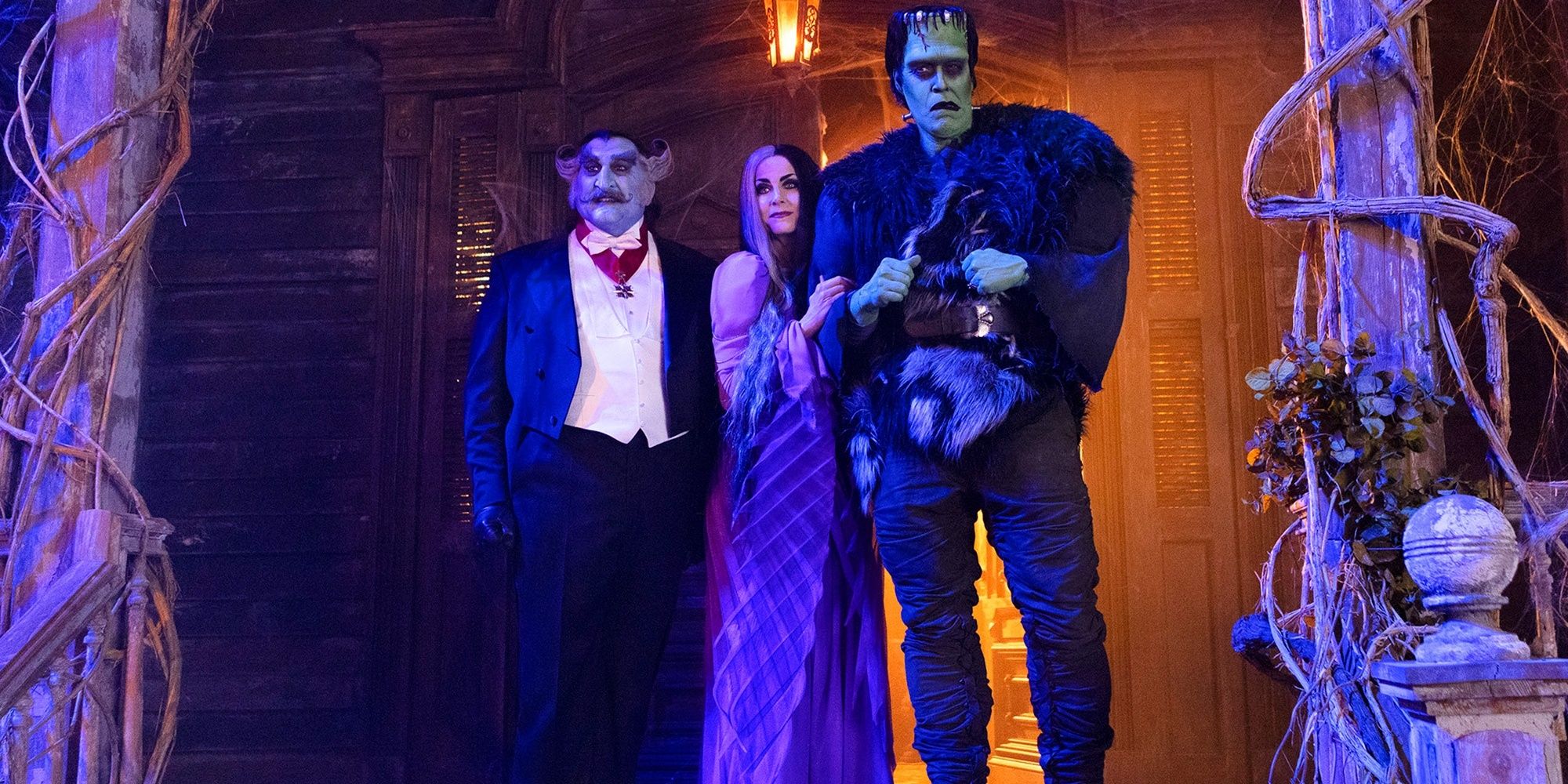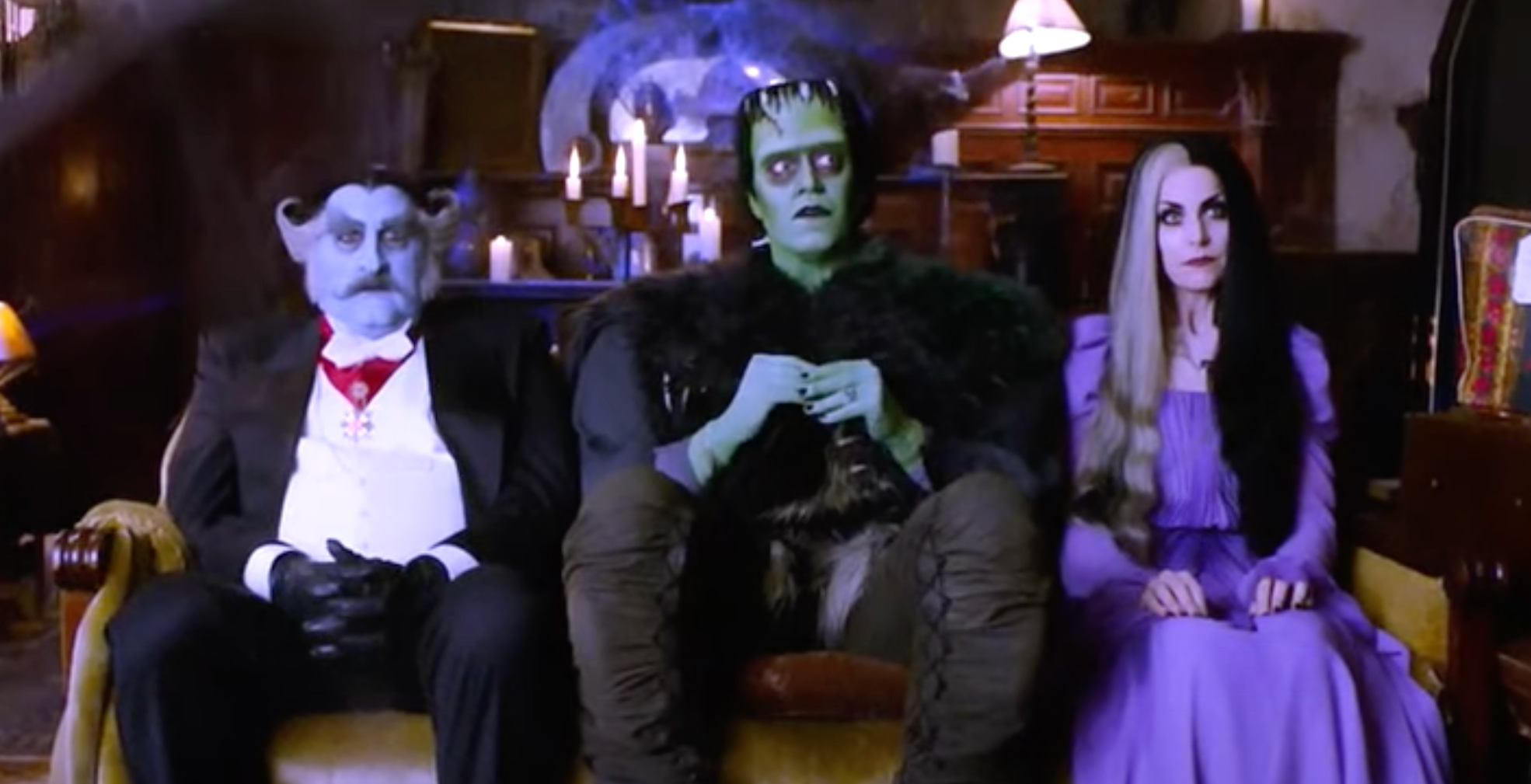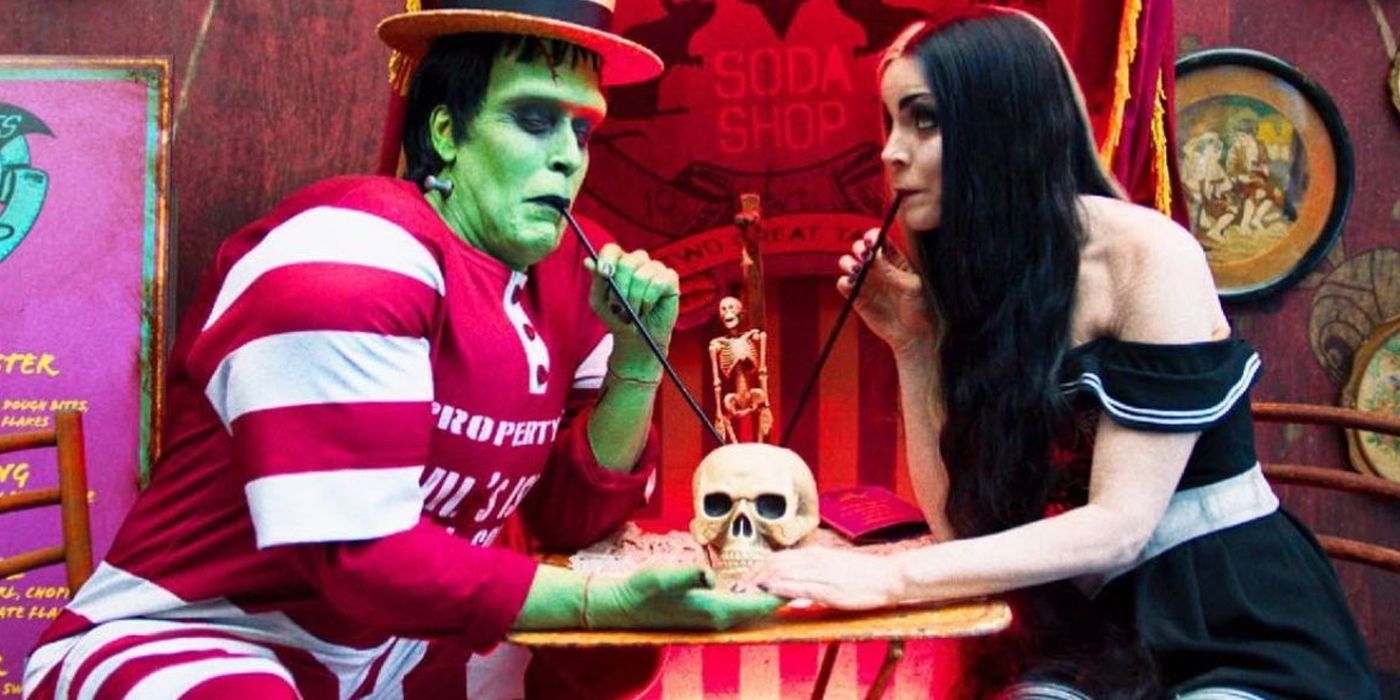The first actual piece of movie footage that audiences were ever treated to from famously theatrical rock musician Rob Zombie is the introductory scene in his debut feature, House of 1000 Corpses, a Texas Chainsaw Massacre-style shocker about a gang of young people who go searching for a mysterious cult figure known as Dr. Satan and end up unwittingly stumbling into the spider’s nest of a particularly nasty family of backwoods butchers. White television static blares, before seguing into Roger Corman-style B&W images of werewolves, mad scientists, and crazed people smashing jack o' lanterns with mallets. What we are actually watching is House of 1000 Corpses' especially warped prologue: a kind of lead-in from a fictional late-night fright program titled "Doctor Wolfenstein’s Creature Feature Show." This clip alone is a veritable riot of horror kitsch, announcing Zombie as the grown-up version of a kid who was raised on splatter flicks, grisly drive-in fare, Alice Cooper records, and Marx Brothers screwball classics.
A lot of Rob Zombie’s peculiar creative approach can be summed up in the Doctor Wolfenstein intro to House Of 1000 Corpses. Watching a Rob Zombie movie often feels like walking through a D.I.Y. haunted house attraction in some godforsaken cornfield just off the main drag – one where the locals are all leering at you, and the scares feel just a bit too real. Zombie’s carnival-barker approach has resulted in one of the most refreshingly idiosyncratic horror filmographies of our time, from the dust-caked, Peckinpah-influenced sadism of The Devil’s Rejects and 3 From Hell to the Mario Bava-inspired impressionism of The Lords of Salem to his divisive and singularly bleak Halloween remakes.
When it was pronounced that Zombie had been developing a feature film update of the spooky, 60s sitcom The Munsters, the announcement made all the sense in the world. In fact, you could probably trace an artistic throughline from the very first scene of House of 1000 Corpses to the eventual news that Zombie was going to take a crack at re-imagining this particular mythology. Watching Zombie’s movies, one gets the sense that he probably spent hours parked in front of the T.V. as a kid, gleefully soaking up the one-of-a-kind vibes of that landmark television program. Even the Transylvanian boogie of the Munsters theme song, composed by Jack Marshall, sounded like the kind of winkingly retro piece of cultural ephemera that Zombie might sample on one of his own records.
For those who need a refresher: The Munsters was a wildly popular show in the vein of Leave It To Beaver and countless others: a study of the midcentury nuclear family living in a quaint American suburb. Of course, in this particular instance, the family in question happen to be a bunch of recognizable, and ultimately well-meaning monsters: Fred Gwynne’s iconic Herman Munster (the head of the family, who resembles Frankenstein’s monster), Yvonne De Carlo’s Lily (the vampiric matriarch of the Munster clan), werewolf child Eddie, and the family's resident Grandpa, who also happened to be a vampire. Today, in a horror landscape that can feel almost depressingly cynical at times, there is something about the Munster family that feels not only quaint and inviting, but downright cuddly.
There is, of course, the lingering question of why exactly a filmmaker like Rob Zombie – who is known, amongst other things, for embracing an unblinking form of nihilistic ultraviolence that often compels viewers to wince in disgust and subsequently shift in their seats – would choose to take on a kid-friendly property that’s all but guaranteed to attract the eyeballs of younger viewers on Netflix. If we’re being honest, though, Rob Zombie is probably one of the only living directors qualified to even try and make a film like this. One quick scan of the man's IMDB credits and suddenly, the question of why anyone would hand the keys to The Munsters over to the lunatic who made the 102-minute vomitorium that was 31 starts to make a twisted kind of sense. In spite of his prankster's streak, Zombie is a surprisingly reverent filmmaker: no one can dispute that he loves and respects the original Munsters, to the degree that it’s difficult to imagine him mucking up the exploits of this titular clan with his signature form of foul-mouthed, white-trash terror. Zombie's only job, with this new project, is to honor the spirit of the original Munsters, and to bring his own gifts to the table in the process.
Zombie will be bringing many familiar faces to his version of The Munsters, including wife and regular muse Sheri Moon Zombie as Lily Munster, Jeff Daniel Phillips as Herman, Daniel Roebuck (who appeared in 31 and 3 From Hell) as The Count, genre legend Dee Wallace, and bad son-of-a-bitch extraordinaire Richard Brake (who was recently quite memorable in the terrific horror film Barbarian) as someone named Dr. Henry Augustus Wolfgang. It remains to be seen how much The Munsters will resemble the rest of Zombie's cinematic output, but honestly, switching gears to a less alienating, more conventional lane might not be the worst career decision at this point. The man's been sticking to his guns for nearly twenty years now. He's earned the right to make his version of a crowd-pleaser if he wants to.
Then again, Zombie’s iteration of The Munsters has been dogged by some unfortunate and largely unfounded conjecture in the months leading up to its release. Rumors of the film’s budget were apparently greatly exaggerated, and, at one point, it was alleged that the Netflix cut would run well over two hours (a bit much, really, at least for this sort of movie). Zombie has since quelled these whispers, which doesn’t change the fact that The Munsters didn’t exactly enjoy a warm reception on Twitter when its trailer was first released back in July. Cynics mocked Zombie for his new movie’s low-budget look (to which we say, pick a side, guys: is the film too expensive, or does it look like it doesn’t cost enough?), while some even compared the new Munsters visual aesthetic to FX’s popular and beloved What We Do In The Shadows.
Whether The Munsters ends up being good, bad, terrible, or merely forgettable remains to be seen. What is difficult to dispute is that Rob Zombie, with his unique and undeniable knack for marrying mischief with the macabre, is one of the only directors currently working who truly feels right for particular property. Because really, what are you going to do: give a Munsters movie over to someone like Ari Aster? There's enough trauma in our world as it is.
In any case, we'll see what the fuss about when Rob Zombie's The Munsters hits Netflix on September 27th.



